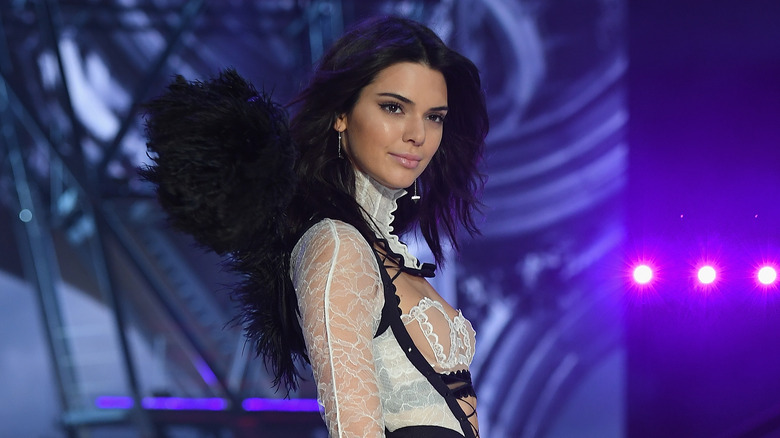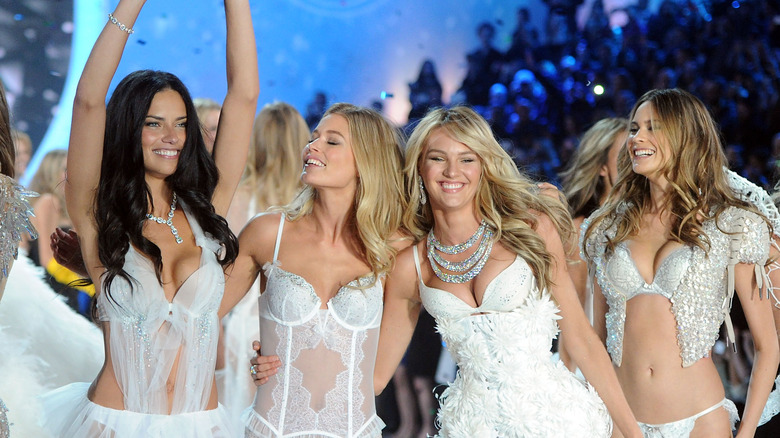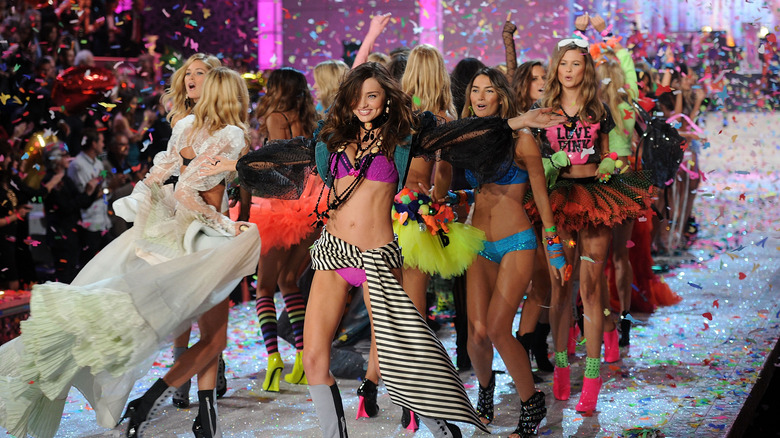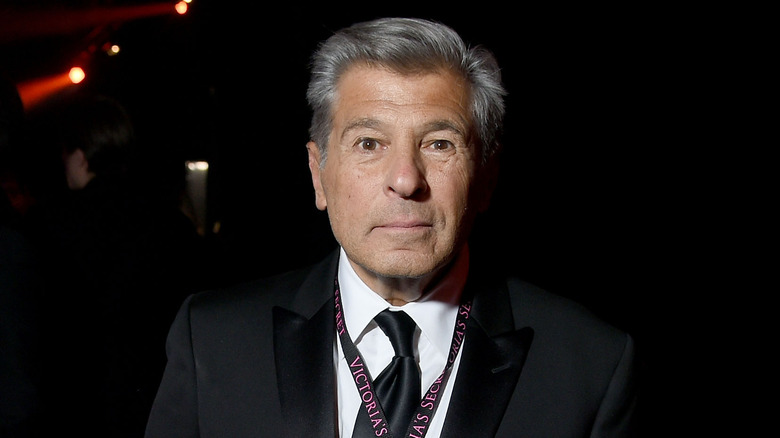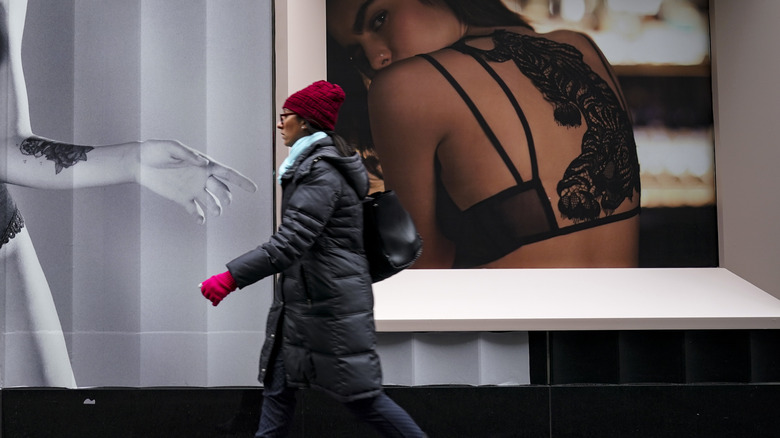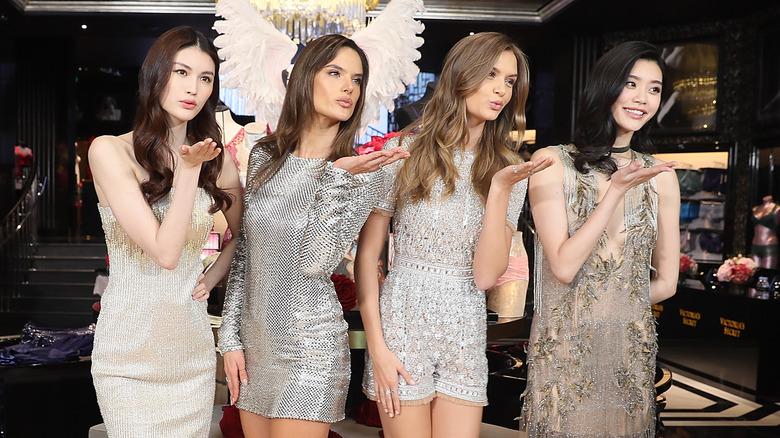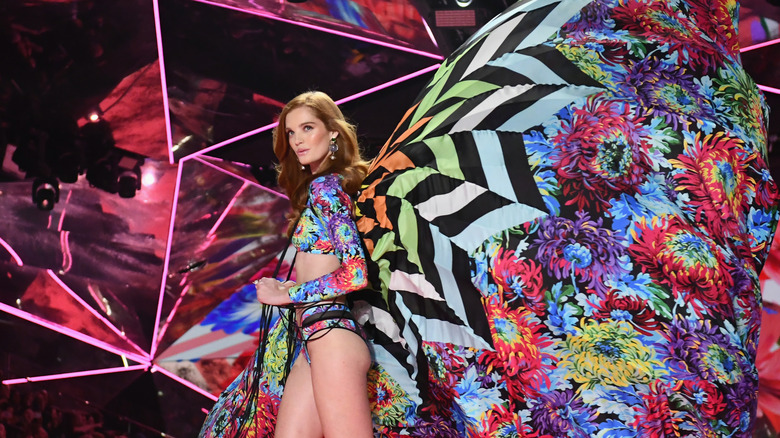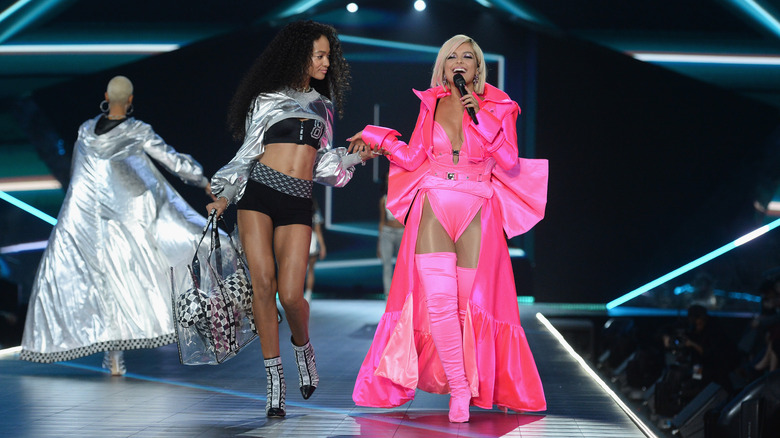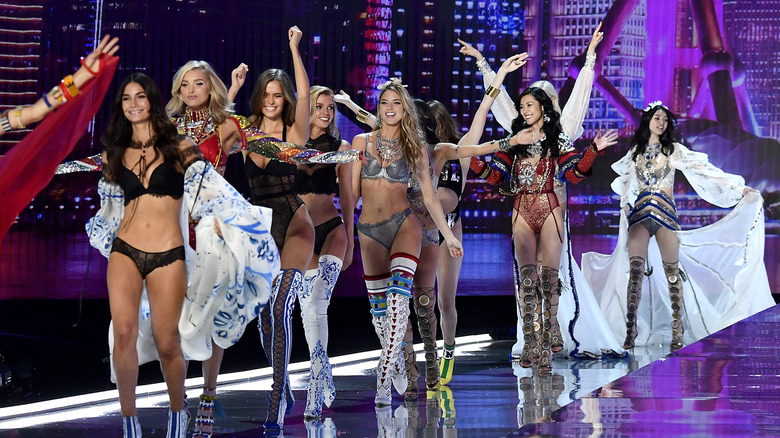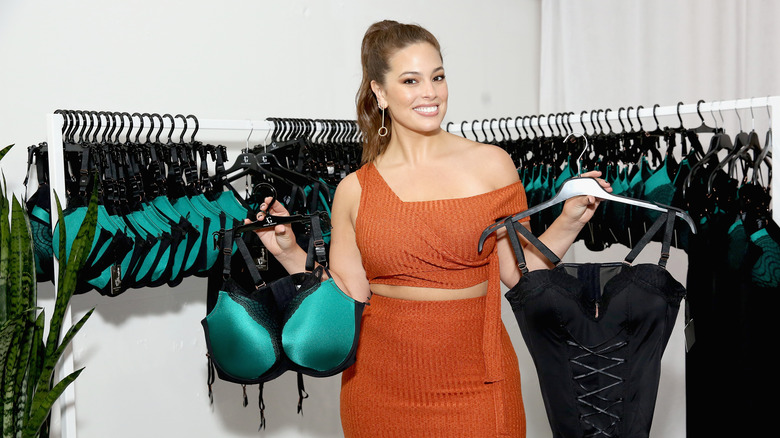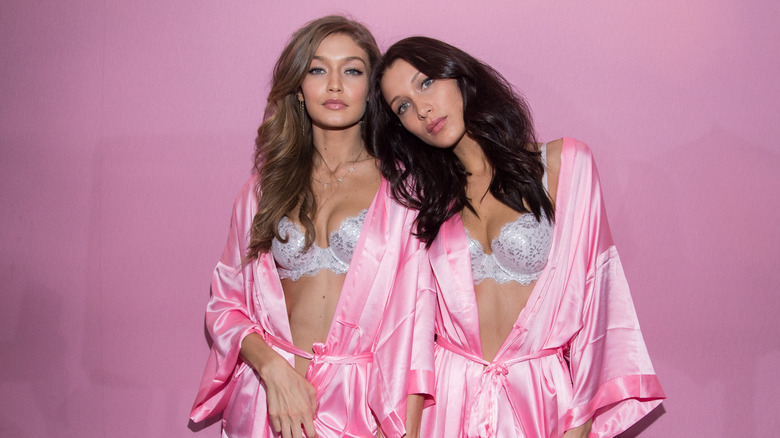The Real Reason Victoria's Secret Canceled Their Televised Fashion Show
Victoria's Secret just can't seem to catch a break. In May 2019, it was announced that Les Wexner, CEO of L Brands, had informed company associates in an internal memo that the world-famous Victoria's Secret Fashion Show would no longer air on network television. The news of the shake-up came on the heels of the company's February 2019 announcement that 53 Victoria's Secret stores would be closing throughout the year.
"The strength and positive perception of the Victoria's Secret brand is unparalleled, and our fashion show has revolutionized the mix of fashion and entertainment around the world," Wexner wrote in his memo, calling the Victoria's Secret Fashion Show "a key factor in the building of the brand." However, whether Wexner and Victoria's Secret executives are willing to acknowledge it or not, reports show that the brand's "positive perception" has seen a massive decline. Could the fashion show's removal from network television be a direct result of the brand's dwindling popularity? Here's a behind-the-scenes look at the real reason Victoria's Secret is canceling their televised fashion show.
It's time for a "fresh look"
When Les Wexner, the chief executive officer of Victoria's Secret's parent company, L Brands (which also owns Bath & Body Works), announced in an internal memo that the brand would be taking its trademark fashion show off broadcast television, he offered little explanation as to exactly why the decision had been made. However, while Wexner may have chosen to remain vague about the specifics behind the shake-up, his message to the chain's associates seemed to hint that it was far from a last-minute decision.
Wexner began the internal memo (via CNBC) by writing, "For the past few months, we've said that we are taking a fresh look at every aspect of our business — from merchandising, marketing and brand positioning, to our real estate portfolio, digital business and cost structure ... literally everything." The news of Victoria's Secret's annual fashion show being stripped from broadcast television may have been unexpected for fans of the program, but, if Wexner's memo is any indication, the brand will likely roll out even more changes as they continue to strategize for the brand's future.
Record low ratings
Though Les Wexner opted to explain the fashion show's removal from broadcast television by revealing that Victoria's Secret had been in the process of refocusing and taking "a fresh look at every aspect" of the company for several months, the program's ratings tell a different story. Numbers from the brand's televised December 2018 fashion show proved that the yearly event, which was once highly anticipated, had simply lost its glittery, confetti-filled appeal in the eyes of viewers.
According to Entertainment Weekly, Victoria's Secret Fashion Show saw its lowest ratings ever with its 2018 special. The publication added that two notable programming changes had been implemented since the special's 2017 airing on CBS — the fashion show had switched to a new network (ABC), and had adopted a new time slot, going from Tuesday night to Sunday night. Despite these changes, the sultry show saw a major drop in viewership, dipping to 3.3 million viewers from the previous year's approximately 5 million viewers.
Ed Razek's controversial comments
As The List covered in the months leading to Victoria's Secret pulling its annual fashion show from broadcast television, Ed Razek, L Brand's chief marketing officer, came under fire in November 2018 for controversial comments he delivered during an interview with Vogue. In the interview — which Razek participated in alongside Victoria's Secret's vice president of public relations, Monica Mitro — the publication noted that newer lingerie brands had been promoting diversity through marketing, including featuring transgender women in their advertisements. When asked if Victoria's Secret felt the need to "address the way the market is shifting in any way," Razek provided a defensive response which many felt was transphobic.
"We market to who we sell to, and we don't market to the whole world," Razek declared. "I'm always asking myself: If we do that, what is the reason we did it? ... Did we include them because it was the right thing to do or because it was the politically correct thing to do? "
The store isn't as popular as it once was
Victoria's Secret used to be the most popular lingerie brand in America, but, as the years have passed, so has the former mall staple's heyday.
In February 2019, L Brands announced that it would be closing 53 of its 1,143 locations in North America, including both Victoria's Secret and standalone Pink stores. According to CNN, the company cited declining sales as the reason for the decision, revealing that sales at stores open for at least a year fell a staggering 7 percent during their most recent quarter. Companies like Amazon and Aerie proved themselves to be direct competitors with the lingerie brand, as an analyst from GlobalData Retail reported that Victoria's Secret had lost 3.8 million customers in two years to the e-commerce marketplace and the American Eagle Outfitters sub-brand (via CNN).
In a report for Business Insider, Mary Hanbury suggested that the brand consider a marketing overhaul to reclaim their throne, saying, "If they were to readdress their fashion show and the way that it's done, and roll out more sizes, and be more inclusive, I think that could have good results for them."
What women want
In April 2018, YouGov's BrandIndex reported that the lingerie brand's "buzz score" among women ages 18 to 49 had dropped from a 2016 high of 31 to a disappointing 23. The brand perception organization also reported that noticeably fewer women within the 18 to 49 age demographic had reported buying from the brand since 2013. According to Forbes, YouGov's CEO of data products, Ted Marzilli, considered the April 2018 decline in Victoria's Secret sales to be a direct result of the #MeToo movement — which went viral in October 2017 — even though the brand had been experiencing declining sales before the online movement garnered such worldwide popularity.
Victoria's Secret may have made a name for itself with risqué advertisements featuring scantily clad models, but, as Forbes contributor Barbara Thau noted in her article, recent American culture has been consistently shifting away from the male gaze in favor of reflecting the female gaze. As women continue to strive for pay equality and bring to light pressing issues such as sexual harassment in the workplace, it only makes sense that a lingerie brand seemingly designed for male pleasure would lose the business of its female customer base.
Will the show find new life online?
In L Brands CEO Les Wexner's internal memo announcing the removal of the Victoria's Secret annual fashion show from broadcast television, the executive made a point not to imply that the event was going away for good.
"Fashion is a business of change. We must evolve and change to grow," Wexner wrote in his memo to associates (via CNBC). "With that in mind, we have decided to re-think the traditional Victoria's Secret Fashion Show. Going forward we don't believe network television is the right fit."
However, just because network television is no longer a suitable home base for the fashion show doesn't mean the company has plans of completely axing it. If Wexner's words are any indication, the more likely scenario is that Victoria's Secret Fashion Show will find new life online. "In 2019 and beyond, we're focusing on developing exciting and dynamic content and a new kind of event ... in ways that will push the boundaries of fashion in the global digital age," Wexner wrote. "I've never been more excited about the power of this brand and where it's going."
"So boring that it's unwatchable"
After the Victoria's Secret Fashion Show aired on ABC in December 2018, Washington Post contributor and fashion critic Robin Givhan penned an op-ed detailing why she personally wasn't a fan of the primetime special. According to Givhan, "the show is so boring that it's unwatchable."
In her piece for the publication, Givhan suggested that the lingerie brand's annual fashion show and everything it entailed was bound for self-destruction, writing, "The one-hour TV special was such a nonevent of excruciating cliches and non-sexiness that it's not worth a cultural renovation. It's a teardown. Or we could all just get out of the way and let it rot until it falls down on its own."
Of course, one person's opinion is exactly that — one person's opinion. However, Givhan was almost certainly not the only person to feel so passionately unimpressed with the show. Calling the fashion show "a fantasy about a particular kind of body," Givhan continued, saying that "a good percentage of the culture is now offended by this, calling that fantasy corrosive, discriminatory and simply outdated."
These angels flew the coop
Perhaps Victoria's Secret Fashion Show's decline in viewership could be traced, in part, to the departure of some of its most popular models — better known to the brand as Victoria's Secret Angels — Miranda Kerr, Alessandra Ambrosio, and Adriana Lima.
In April 2013, it was reported that Kerr had been removed as a Victoria's Secret Angel reportedly due to her alleged "difficult reputation." However, Kerr told The Sydney Morning Herald she had been the one to make the decision to leave. "I'm now entering a new phase in my life," Kerr told the publication. "I have felt this coming since my son was born and, after I became a mother, I realized I needed to prioritize my time."
Ambrosio, who walked the Victoria's Secret Fashion Show runway for 17 years, announced she was hanging up her angel wings in November 2017. The model thanked her fellow Angels on Instagram, writing, "It gives me great pride to be part [of] the Victoria's Secret movement! I will always be cheering for you!"
One year later, Lima also announced her departure from the brand after 19 years, thanking "the best fans in the [world]" via Instagram.
Calls for diversity
L Brands' chief marketing officer, Ed Razek, came under fire during his November 2018 Vogue interview for controversial comments he made regarding the inclusion of transgender women within the Victoria's Secret brand. However, trans women weren't the only group of people Razek targeted — the CMO also delivered problematic comments regarding plus-size women, as well.
Boasting that Victoria's Secret had "invented the plus-size model show in what was [their] sister division, Lane Bryant," Razek went on to claim that the lingerie brand's lack of plus-size models was not their fault. "We attempted to do a television special for plus-sizes [in 2000]," he said. "No one had any interest in it, still don't."
However, Razek couldn't have been more wrong. Before the CMO's Vogue interview even hit the stands, plus-size model Robyn Lawley launched a Change.org petition calling for people to boycott the Victoria's Secret Fashion Show to "help change the minds of Victoria's Secret to be more diverse and inclusive of body shapes and sizes on their runways." As of May 2019, the petition has garnered over 10,000 signatures.
Bigger and better competition
Ed Razek's comments that people don't have an "interest" in seeing plus-size models were particularly tone deaf, considering multiple fashion designers and influencers had long been making headlines for their own inclusion and representation of various body types.
In 2017, supermodel Ashley Graham's lingerie collection, Addition Elle, made its New York Fashion Week debut to rave reviews. Graham used only plus-size models throughout the show, something which Sarah Chiwaya, a "plus-fashion blogger and editor," found particularly refreshing. "I've been covering fashion week for about four years and it's usually only one body shape and size," Chiwaya told AFP (via Fashion United), adding, "She's really brought a spotlight to a lot of things."
Rihanna also made a splash in the fashion industry with her lingerie collection, Savage x Fenty, during 2018's New York Fashion Week. Much to the delight of fans, the star's runway show featured models of all shapes, sizes, and ethnic backgrounds — including a pregnant woman who reportedly walked the runway while she was in labor. "I wanted every woman on the stage with different energies, different races, body types, [and] different stages in their womanhood," Rihanna revealed in an interview with Elle.
Comfort over catwalk
According to The New York Times, a 2017 Wells Fargo consumer study regarding Victoria's Secret revealed that 68 percent of respondents liked the brand less than before, while 60 percent of respondents felt the brand felt "forced" or "fake." Sara Lynn Michener, who told the NYT she stopped shopping at Victoria's Secret "about 10 years ago," revealed her reluctance to patronize the brand's stores was due mostly to their "pinkness," as well as the larger-than-life visuals featuring impossibly perfect "glamazon" models.
Heidi Zak, the CEO of ThirdLove, told the NYT that she was inspired to start her company after being discouraged by Victoria's Secret's lack of variety in their bra sizes and styles. And, according to ThirdLove customers, the online retailer offered products they had desperately been searching for. "I feel secure in ThirdLove," Blair Imani told the publication. "I love that they have nude for every skin color, not just beige. And they are functional and affordable, but I don't feel like I'm losing the feeling of being beautiful when I wear them." Victoria's Secret may have pretty bras, but, as they say, looks aren't everything.
